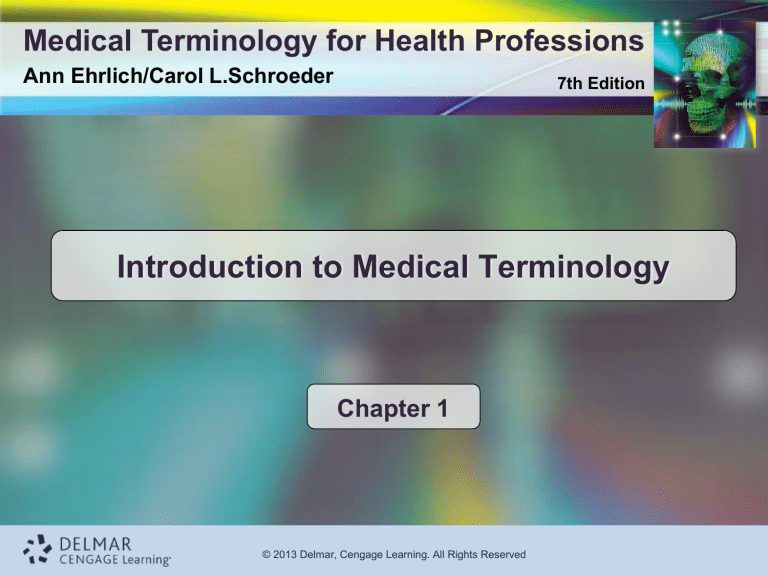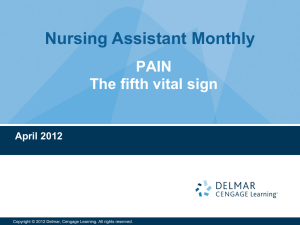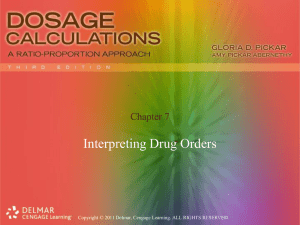11-1188_Ch01

Medical Terminology for Health Professions
Ann Ehrlich/Carol L.Schroeder
7th Edition
Introduction to Medical Terminology
Chapter 1
© 2013 Delmar, Cengage Learning. All Rights Reserved
Primary Medical Terms
• Primary medical terms enable you to prioritize terms in your study of medical terminology.
© 2013 Delmar, Cengage Learning. All Rights Reserved
What Parts Are the Key!
• Four basic types of word parts are used to create complex medical terms:
– Word roots
– Combining forms
– Suffixes
– Prefixes
© 2013 Delmar, Cengage Learning. All Rights Reserved
(continues)
What Parts Are the Key!
© 2013 Delmar, Cengage Learning. All Rights Reserved
Word Parts Work Together
Click Here to play Word Parts
Work Together animation
© 2013 Delmar, Cengage Learning. All Rights Reserved
Word Roots
• Word roots usually, but not always, indicate the part of the body involved.
© 2013 Delmar, Cengage Learning. All Rights Reserved
(continues)
Word Roots
• Examples:
– cardi = heart
– gastr = stomach
– neur = nerve
Note: Word roots do not mean pertaining to or relating to; that meaning comes from the suffix.
© 2013 Delmar, Cengage Learning. All Rights Reserved
Combining Forms
• Created by adding a vowel (usually the letter
“ o ”) to the end of a word root.
• Used when connecting word roots or when the word root is joined to a suffix that begins with a consonant.
© 2013 Delmar, Cengage Learning. All Rights Reserved
(continues)
Combining Forms
• Examples:
– cardi/o = heart
– gastr/o = stomach
– neur/o = nerve
© 2013 Delmar, Cengage Learning. All Rights Reserved
(continues)
Combining Forms
© 2013 Delmar, Cengage Learning. All Rights Reserved
Suffixes
• Suffixes usually, but not always,indicate the procedure, condition, disorder, or disease.
• Examples:
– cardio megaly
– gastr algia
– neur itis
© 2013 Delmar, Cengage Learning. All Rights Reserved
(continues)
• Examples:
Suffixes
© 2013 Delmar, Cengage Learning. All Rights Reserved
Prefixes
• Prefixes usually, but not always, indicate location, time, number, or status.
• Examples:
– peri cardium
– epi gastric
– poly neuritis
© 2013 Delmar, Cengage Learning. All Rights Reserved
(continues)
• Examples:
Prefixes
© 2013 Delmar, Cengage Learning. All Rights Reserved
Determining Meanings on the
Basis of Word Parts
• Decipher these medical terms based on their word parts:
– cardiologist
– gastritis
– neuralgia
© 2013 Delmar, Cengage Learning. All Rights Reserved
(continues)
Determining Meanings on the
Basis of Word Parts
• An example to take apart
:
© 2013 Delmar, Cengage Learning. All Rights Reserved
Combining Word Parts
Click Here to play Combining
Word Parts animation
© 2013 Delmar, Cengage Learning. All Rights Reserved
Additional Lessons in This Chapter
• Using a medical dictionary
• The “sounds-like” pronunciation system
• Why spelling counts
• Caution when using abbreviations
© 2013 Delmar, Cengage Learning. All Rights Reserved
(continues)
Additional Lessons in This Chapter
• Singular and plural endings
• Basic medical terms
• Look-alike, sound-alike terms and word parts
© 2013 Delmar, Cengage Learning. All Rights Reserved
Key Word Parts and Definitions
• -algia
– pain, painful condition
• dys-
– bad, difficult, or painful
• -ectomy
– surgical removal, cutting out, excision
• hyper-
– excessive, increased
(continues)
© 2013 Delmar, Cengage Learning. All Rights Reserved
Key Word Parts and Definitions
• hypo-
– deficient, decreased
• -itis
– inflammation
• -osis
– abnormal condition, disease
(continues)
© 2013 Delmar, Cengage Learning. All Rights Reserved
Key Word Parts and Definitions
• -ostomy
– the surgical creation of an artificial opening to the body surface
• -otomy
– cutting, surgical incision
• -plasty
– surgical repair
• -rrhage
– bleeding, abnormal excessive fluid discharge
(continues)
© 2013 Delmar, Cengage Learning. All Rights Reserved
Key Word Parts and Definitions
• -rrhaphy
– surgical suturing
• -rrhea
– flow or discharge
• -rrhexis
– rupture
• -sclerosis
– abnormal hardening
© 2013 Delmar, Cengage Learning. All Rights Reserved
Questions
© 2013 Delmar, Cengage Learning. All Rights Reserved
Question
A vertebra is a bone in the spine. What is the plural of vertebra ?
a. vertebras b. vertebri c. vertebrae
© 2013 Delmar, Cengage Learning. All Rights Reserved
Answer c. vertebrae
© 2013 Delmar, Cengage Learning. All Rights Reserved
Question
Intrameans within or inside.
True or False?
© 2013 Delmar, Cengage Learning. All Rights Reserved
Answer
False. Inter- means within or inside.
Intrameans between or among.
© 2013 Delmar, Cengage Learning. All Rights Reserved
Question
Losing a large amount of blood in a short time is a: a. hemorage b. hemorrhage c. hemorhage
© 2013 Delmar, Cengage Learning. All Rights Reserved
Answer b. hemorrhage
© 2013 Delmar, Cengage Learning. All Rights Reserved
Question
The ilium is part of the hip bone, and the ileum is part of the small intestine.
True or False?
© 2013 Delmar, Cengage Learning. All Rights Reserved
Answer
True
© 2013 Delmar, Cengage Learning. All Rights Reserved
Answers to Learning Exercises
© 2013 Delmar, Cengage Learning. All Rights Reserved
Chapter 1 Answers
Matching Word Parts 1
1.1. dys-
1.2. hyper-
1.3. -megaly
1.4. -algia
1.5. -ectomy
Matching Word Parts 2
1.6. -osis
1.7. -malacia
1.8. hypo-
1.9. -itis
1.10. -necrosis
© 2013 Delmar, Cengage Learning. All Rights Reserved
Chapter 1 Answers
Matching Word Parts 3
1.11. -rrhage
1.12. -ostomy
1.13. -otomy
1.14. -plasty
1.15. -rrhaphy
Matching Word Parts 4
1.16. -scopy
1.17. -rrhexis
1.18. -stenosis
1.19. -sclerosis
1.20. -rrhea
© 2013 Delmar, Cengage Learning. All Rights Reserved
Chapter 1 Answers
Definitions
1.21.
myelopathy
1.22.
hypertension
1.23.
natal
1.24.
symptom
1.25.
disease
Matching Terms and
Definitions 1
1.26.
leukocyte
1.27.
prognosis
1.28.
edema
1.29.
acute
1.30.
supination
© 2013 Delmar, Cengage Learning. All Rights Reserved
Chapter 1 Answers
Matching Terms and
Definitions 2
1.31.
palpation
1.32.
exudate
1.33.
lesion
1.34.
palpitation
1.35.
laceration
Which Word?
1.36.
gastritis
1.37.
suppuration
1.38.
trauma
1.39.
viral
1.40.
appendectomy
© 2013 Delmar, Cengage Learning. All Rights Reserved
Chapter 1 Answers
Spelling Counts
1.41.
eponym
1.42.
inflammation
1.43.
fissure
1.44.
neurorrhaphy
1.45.
tonsillitis
Matching Terms
1.46.
gastrosis
1.47.
syndrome
1.48.
myorrhexis
1.49.
gastralgia
1.50.
pyoderma
© 2013 Delmar, Cengage Learning. All Rights Reserved
Chapter 1 Answers
Term Selection
1.51. arteriosclerosis
1.52.
sign
1.53.
gastroenteritis
1.54.
arthralgia
1.55.
dermatologist
Sentence Completion
1.56.
hypotension
1.57.
angiography
1.58.
supracostal
1.59.
differential
1.60.
fistula
© 2013 Delmar, Cengage Learning. All Rights Reserved
True/False
1.61.
True
1.62.
False
1.63.
True
1.64.
False
1.65.
True
Chapter 1 Answers
Word Surgery
1.66.
ot/o, rhin/o, laryng, -ology
1.67.
myc, -osis
1.68.
poli/o, myel, -itis
1.69.
neo-, nat, -ology
1.70.
end-, arteri, -al
© 2013 Delmar, Cengage Learning. All Rights Reserved
Chapter 1 Answers
Clinical Conditions
1.71. intramuscular
1.72. abdominocentesis
1.73. acronym
1.74. phalanges
1.75. triage
1.76. diagnosis
1.77. pathology
1.78. remission
1.79. pyrosis
1.80.
diarrhea
Which Is the Correct
Medical Term?
1.81.
neuroplasty
1.82.
hemorrhage
1.83.
arterionecrosis
1.84.
interstitial
1.85.
hepatomegaly
© 2013 Delmar, Cengage Learning. All Rights Reserved
Chapter 1 Answers
Challenge Word Building
1.86.
cardiologist
1.87.
rhinorrhea
1.88.
arthritis
1.89.
neonatologist
1.90.
neurotomy
1.91.
carditis
1.92.
rhinalgia
1.93.
neuralgia
1.94.
cardiotomy
1.95.
rhinitis
Labeling Exercises
1.96. myel/o
1.97.
my/o
1.98.
myel/o
1.99.
neur/o
1.100.
arthr/o
© 2013 Delmar, Cengage Learning. All Rights Reserved





